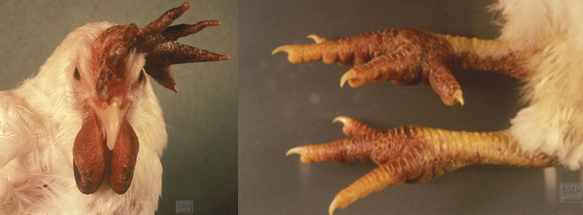Important Update - Avian Influenza H7N8
9 July 2024
Avian Influenza (AI) (H7N8) has been detected in poultry and birds in the Greater Sydney Basin and ACT.
The avian influenza H7N8 strain detected in NSW and ACT is NOT the same as the H5N1 strain that is causing concern globally and is not connected to the Victorian outbreak.
Emergency zones are now in place for impacted regions in the Greater Sydney Basin, and the ACT border region. The movement of birds and bird products within, and to outside the emergency zones, including to and from bird shows, is prohibited.
AI is a highly contagious viral disease primarily affecting avian species. AI infection in domestic poultry and birds can result in variable signs, from no obvious signs to sudden death.
What are the signs of high pathogenicity avian influenza?
Affected birds can display any of the following signs:
- Sudden death or elevated flock mortality
- Decreased feed and/or water consumption
- Reduction in egg production or increased number of misshapen or shell-less eggs
- Watery eyes
- Sinusitis
- Darkening of the comb, wattles or legs (Fig 1a and b)
- Swelling of the head, face, upper neck and feet (Fig 1a and b)
- Ruffled feathers
- Loss of appetite
- Diarrhoea
- Neurological signs.
More information can be found on the NSW Department of Primary Industries and Regional Development website.

Figure 1a – Bird with a swollen head, combs and wattles, noting the darkened combs and wattles;
Figure 1b - Swollen and darkened legs and feet. Image credit: Dr D Swayne, USDA, Iowa State University Department of Veterinary Pathology, Center for Food Security and Public Health (CFSPH), Armed Forces Institute of Pathology (AFIP), and Plum Island Animal Disease Center (PIADC).
If you are a bird show organiser or bird owner and are considering either hosting or attending an event, you should:
- Check if you are in an emergency zone using the interactive map on the NSW Department of Primary Industries and Regional Development website.
- Check if there are movement restrictions in place that may prevent you from hosting or participating in an event, or require you to take an alternate route to the event.
If you are organising a bird show during this period of avian influenza control, you should consider:
- the proximity of the show to the emergency zones and the risk of bird movements involved. It is essential that there is no movement of birds from an emergency zone;
- keeping detailed records of exhibitors and attendees and the birds submitted for the shows. This will help with tracing if there were to be an avian influenza detection;
- limiting the handling of birds where possible and ensuring your hands are sanitised appropriately between handling birds;
- minimising direct contact between birds from different owners. Keep birds in their own cages or enclosures and avoid communal areas;
- positioning hand washing facilities so that people handling birds are encouraged to wash their hands with soap and running water when exiting animal enclosures and before entering any designated eating areas;
- maintaining a clean and sanitised environment. Regularly clean and disinfect the venue, especially high-traffic areas;
- advising participants to monitor their birds for any signs of illness after the show and report any concerns immediately to the Emergency Animal Disease Hotline on 1800 675 888.
If you are attending an event, you should:
- observe your birds for any signs of illness before, during and after the event. If you notice any unusual signs of disease, isolate the affected bird(s) immediately and call the 24-hour Emergency Animal Disease Hotline on 1800 675 888;
- do not bring unwell birds to the event;
- ensure your birds do not mix directly with other birds at the event;
- ensure there’s appropriate distance between your birds’ cage(s) and others to reduce the risk of disease transmission;
- disinfect your birds' cages, feeders and water containers before and after the show;
- ensure you do not share cages, feeders, bedding or equipment with other bird owners at the show;
- minimise the amount of time your birds spend at the show to reduce exposure.
Am I at risk of contracting avian influenza by attending a bird show?
Do not attend any event if you are unwell (particularly any cough, fever, runny nose, sore throat).
Transmission of avian influenza to humans is rare. Most people are not at risk of contracting avian influenza.
You may be at higher risk if you have contact with birds or animals that are infected with avian influenza, or their secretions (saliva, blood and faeces).
Always wash your hands with soap and running water after touching or handling birds, their enclosures, environments, or food containers.
Remember, if any birds are unwell or there are any concerns of bird illness, wear appropriate personal protective equipment to reduce your risk of getting avian influenza. This includes a P2/N95 mask, goggles, gloves and protective clothing.
For more information on avian influenza in humans visit the NSW Health avian influenza factsheet.
Where can I find out more information?
It is vital that you to stay informed to prevent and mitigate the risk of the disease spreading. For more information, visit the NSW Department of Primary Industries and Regional Development website.
Avian influenza is a notifiable disease in NSW. If you notice signs of disease or consistent with avian influenza, you must report it immediately to your veterinarian, the 24-hour Emergency Animal Disease Hotline on 1800 675 888 or Local Land Services on 1300 795 299 (during business hours).



